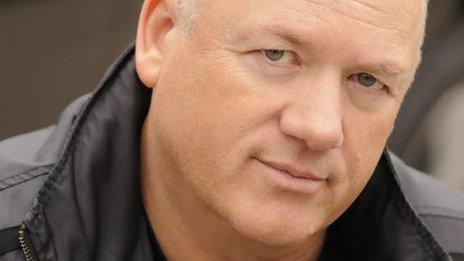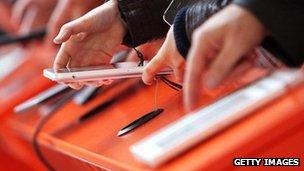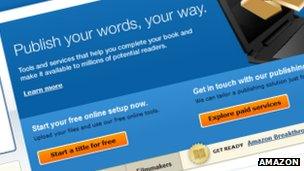The authors who are going it alone online - and winning
- Published

John Locke was the first self-published author to sell one over a million copies on Amazon - making him a New York Times bestseller
"Company policy, not mine. Were it up to me, we would. The revolution is not yet complete."
A change in policy at the 164-year-old Chicago Tribune is not something to be taken lightly.
But when Julia Keller, the newspaper's Pulitzer Prize-winning cultural critic, calls something a "revolution", you sense things may be about to change.
She's referring to her newspaper's policy on reviewing self-published books. It's a simple one: they don't.
And until recently, it would be unthinkable to even consider over-ruling it as an obvious method of quality control.
After all, why would any newspaper - particularly one of the world's most respected - be bothered reading the work of an author who for whatever reason couldn't find anyone to publish their work?
"There was a definite stigma clinging to it," Ms Keller continues.
"A bad odour that reeked of desperation and flagrant ego."
But as more self-published authors hit the big time, that reputation is perhaps beginning to drift away.
"That odour is almost completely banished.
"Now, I think of a self-published author as an entrepreneur, an energetic soul determined to forge her or his own destiny in the cultural world."
'Complete transition'
Tailored services like Amazon CreateSpace, Lulu and Smashwords have put creating and distributing a book firmly into the hands of anyone and everyone.
It means that now, in bestseller lists, alongside literature's world-famous, you'll discover the likes of John Locke.
Last year, he became the eighth member of a highly desirable pack - the Kindle Million Club - a special few who have surpassed the one million sales mark in Amazon's Kindle store.
"We're in the stages of a complete transition," Mr Locke told the BBC.
"Self-published authors were made to feel second rate, and ridiculed. It's perhaps the only industry where that takes place.

More and more e-readers, some at budget prices, are coming into the market
"When I went into the insurance business and put up my own money, nobody considered it a 'vanity' investment."
"But when I had the courage and belief in myself to write my own books and publish them, I was labelled as a vanity author - someone who couldn't measure up."
"Now, the playing field has levelled because of the access to electronic media."
The astronomical rise of the e-reader means that vanity publishing no longer means taking a massive gamble by getting physical copies printed only to see them pile up in an unfortunate relative's garage.
Self-publishing specialists not only make unleashing a book into the world a free, five-minute process - but they also give authors the lion's share of the profits, in some cases as high as 80% or 90%.
Traditional publishers, meanwhile, are more likely to give their authors around 25% of e-book sales. For printed copies, even less.
'Energy and impetus'
But does this mean authors who have signed traditional book deals are being ripped off?
Not at all, argues author and journalist Joanne Mallon.
She published her own book, The Beginner's Guide to TV Interviews, as an e-book through her website. She is reluctant to do it again.
"It showed me that if you're a writer, and you want to write books, and you've got the ideas and the passion, it doesn't necessarily follow that you have all the skills to make it into a book."
"It's quite insulting to professionals in the publishing world to assume that you would have all of their skills."
Her latest book, Toddlers: An Instruction Manual, has been crafted with the close help of a traditional publisher.
"It's that sort of energy and impetus that you get," she says. "And an extra viewpoint from somebody who is not as close to the material that you are that makes a big big difference."
Even for strong advocates of self-publishing, the benefits of tried and tested routes to market are still, to some, the most appealing.

Amazon's CreateSpace puts self-published books in front of a potentially enormous audience
"At this point in time, a publishing deal is on the whole still a better option for a new author," argues Clare Christian, who runs the Self-Publishing Advice Service.
"You get a lot of the pressure taken off you if a publisher takes over."
Her business offers advice on producing self-published novels and effectively marketing them.
Far from fuelling vanity projects, Ms Christian says services like hers offer a fairer and more transparent way of getting a book to market for people who may not have the business know-how to do so.
"The reason I started doing what I do was because all the questions I was getting asked were about how to get self-published, or if they have been self-published, how to become credible.
"If you haven't worked in the publishing industry, how would you know where to start?"
'Splendid trend'
Even for the wildly successful self-publishers, it seems sooner or later assistance will be needed.
For Mr Locke, this comes in the form of a distribution deal with Simon & Schuster, a company he says he "applauds" for their attitude to self-publishing.
While another well-renowned independent author, Amanda Hocking, recently signed a four-book deal with St Martin's Press. A contract which, according to the New York Times, was worth $2m (£1.3m).
In doing so, she blogged, external: "I want to be a writer. I do not want to spend 40 hours a week handling e-mails, formatting covers, finding editors, etc.
"Right now, being me is a full-time corporation."
While the pressures on the most successful self-publishers can become unwieldy for a one-person operation, for those that do successfully combine entrepreneurial spirit with a creative writing flair, the rewards can enormous.
Not just for the author, fans argue, but for the readers, who by voting with their wallets have proven that the companies in control of what hits our bookshelves may not always get it right.
"Frankly, I think self-publishing is a splendid trend," Ms Keller, from the Chicago Tribune, says.
"Anything that challenges gatekeepers is a good and healthy thing."
One of the crucial gatekeepers, Ms Keller admits, are the newspaper reviewers - which is why she's arguing for a change of the Tribune's age-old policy.
"I think about it so much. We're getting ready to start a new literary journal at the Tribune. We need to be at the front of this trend.
"We need to remove this terrible prejudice we have against it."